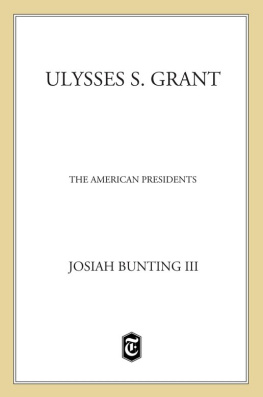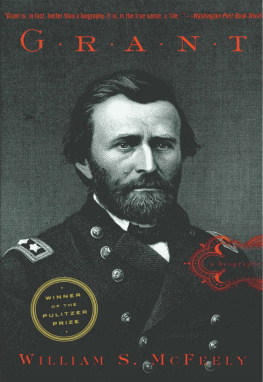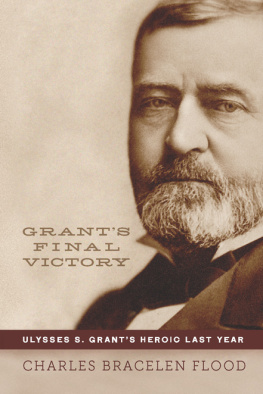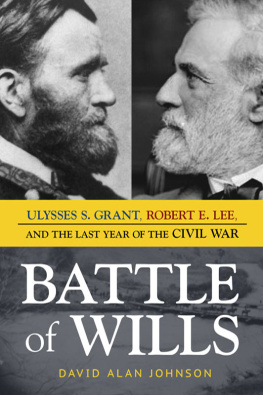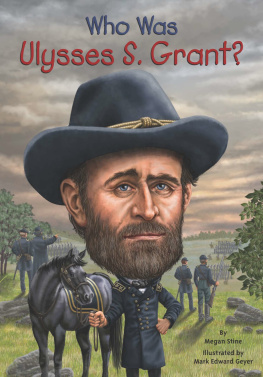
I owe particular debts of gratitude to several friends and colleagues who were generous with time and counsel in my preparation of this small book on Ulysses Grant: John Y. Simon, dean of Grant historiographyas wise, judicious, shrewd, and self-effacing as his subjectwas particularly helpful. Two other Grant scholars, Brooks Simpson and Jean Edward Smith, provided valuable advice and aperus. Former secretary of the army John O. Marsh was most helpful in the early stages of my research.
I also want to thank Selma Brittingham, David McCulloughwho is unfailingly generous to anyone who writes history or biography, however small their pretensions to do eitherLori O. Parrent, Gardner Mundy, Kevin Rolando, Fitzgerald Bemiss, Waite Rawles, Joseph J. Ellis, Professor James Robertson, Professor Spencer Tucker, Generals Montgomery Meigs and Casey Brower, Ward Good, Jack Chambliss, Colonel Cash Koeniger, Victor Davis Hanson, John Winslow, Louise Grosvenor, Patrick Lang, Kenneth Cribb. Finally, I must thank my editor at Times Books, Paul Golob; the general editor of the American Presidents series and an inspiration to all American historians, Arthur Schlesinger, Jr.; my agent, Tina Bennett; and my wife, Diana Bunting.
The Advent of Frederick Giles
All Loves Excelling
An Education for Our Time
The Lionheads
JOSIAH BUNTING III is a former army officer who for eight years led his alma mater, the Virginia Military Institute. His earlier books include The Lionheads, The Advent of Frederick Giles, An Education for Our Time, and All Loves Excelling. He serves currently as chairman of the National Civic Literacy Board at the Intercollegiate Studies Institute in Wilmington, Delaware. He lives with his family in Newport, Rhode Island.
1822 Hiram Ulysses Grant born in Point Pleasant, Ohio, on April 27
183943 Grant attends the United States Military Academy in West Point, New York, and is rechristened Ulysses Simpson Grant
1845 Annexation of Texas
1846 Mexico declares war on the United States; Grant sees first combat at Palo Alto, Resaca de la Palma, and Monterrey, under the command of General Zachary Taylor
1847 Capture of Mexico City by General Winfield Scotts troops
1848 Treaty of Guadalupe Hidalgo ends the Mexican War; Grant marries Julia Dent; Taylor elected president
1852 Grant assigned to peacetime military duty in California
1854 Grant resigns from the U.S. Army; Kansas-Nebraska Act passed; formation of the Republican party
1856 James Buchanan wins the presidency, defeating John C. Frmont, the first Republican presidential candidate
1857 Dred Scott decision
1858 Lincoln-Douglas debates
1860 Grant moves to Galena, Illinois; Abraham Lincoln elected president; secession crisis
1861 Lincoln takes office; Fort Sumter attacked and captured by Confederate troops; Grant appointed colonel of the Twenty-first Illinois volunteers regiment in June and is promoted tobrigadier general two months later; wins Battle of Belmont on November 6
1862 Grant forces unconditional surrender of Fort Donelson on February 16; Battle of Shiloh, April 67
1863 Lincoln issues the Emancipation Proclamation; Battle of Gettysburg; surrender of Vicksburg; Union victory at Chattanooga
1864 Grant promoted to lieutenant general and commanding general, all Union armies; Battle of the Wilderness; fall of Atlanta; Shermans march to the sea
1865 Grant receives Lees surrender at Appomattox on April 9; assassination of Abraham Lincoln on April 14; ratification of Thirteenth Amendment, eliminating slavery
1868 Impeachment of President Andrew Johnson; ratification of the Fourteenth Amendment; Grant elected president
1869 Grant inaugurated on March 4; Black Friday scandal; Santo Domingo controversy
1870 Ratification of the Fifteenth Amendment, granting blacks the right to vote
1871 Last of the southern states, Georgia, to be reseated in Congress; Ku Klux Klan Act passed; Washington Treaty signed with Great Britain
1872 Grant reelected president
1873 Back Pay Grab by Congress; Panic of 1873 begins economic depression and crisis
1874 Veto of congressional greenback bill; Democrats regain control of House of Representatives in midterm elections
1875 Grant signs Specie Resumption Act; declares he will not seek a third term
187677 Disputed presidential election between Rutherford B. Hayes and Samuel J. Tilden; Hayes declared victor by electoral commission on February 28, 1877
187779 Grant and Julia take their round-the-world trip
1880 Grants name placed in nomination at Republican convention, but effort fails; James A. Garfield nominated and elected president
1881 Assassination of Garfield; Chester Arthur becomes president
1884 Collapse of the Grant and Ward firm, ruining Grant financially
1885 Grant dies at Mt. McGregor, New York, on July 23; publication of Grants Memoirs restores family finances
Source materials available to scholars and students of Ulysses S. Grant comprise numerous manuscript collections, congressional reports, presidential messages.
The Personal Memoirs of U.S. Grant (Cambridge: Da Capo Press, 2001) are devoted almost entirely to a narrative history of the Mexican War and the Civil War, and of the authors role in each. Grant is a writer of rare fluency and accuracy: he is devastatingly honest in his judgments of himself, and not without a certain gaminerie .
Any serious student of U. S. Grants career must rely principally on The Papers of U. S. Grant , volumes 126 (volume 26 ends in 1875; several more volumes are planned), edited by John Y. Simon (Carbondale: Southern Illinois University Press, 1967). Since 1962, Dr. Simon has supervised the collection and editing of all Grant personal papers. His is a monumental achievement.
Several biographies of Grant, studies of the Grant presidency, and books on politics, the economy, Reconstruction, and foreign policy have been particularly useful to my book:
Apart from one or two studies, William B. Hesseltine, Ulysses Grant, Politician (New York: Frederick Ungar, 1935), remains the only full-scale literal biographical consideration of Grant as president. The book is brilliant, exhaustive, quirky, and often funny. A snobbismthe condescension of the brilliant scholar to the rude and taciturn politicianinflects the text throughout.
William McFeeley, Grant (New York: Norton, 1982), covers the full life of Grant. Much praised on publication, it is uneven in quality and often hostile to Grant, and particularly critical of Grants presidentialleadership during Reconstruction. The book is full of clever imputation, most of it amusing, some of it wrong.
Geoffrey R. Perret, Ulysses S. Grant: Soldier and President (New York: Random House, 1997), is a strong, rambunctious biography, strongly prejudiced in Grants favor.
John A. Carpenter, Ulysses S. Grant (New York: Twayne, 1970), is the best available small biography of Ulysses S. Grant. It is careful, judicious, meticulously researched, and fair. The book focuses mainly on the Grant presidency.
Brooks D. Simpson, Ulysses S. Grant, Triumph Over Adversity, 18221865 (New York: Houghton Mifflin, 2000), is the first volume of a projected two-volume biography of Grant. A meticulous scholar, Simpson has devoted most of his professional life to a consideration of Grants role in the Civil War, and, particularly, during the period between Grants victory, in 1865, over Lee and his election to the presidency in 1868.

